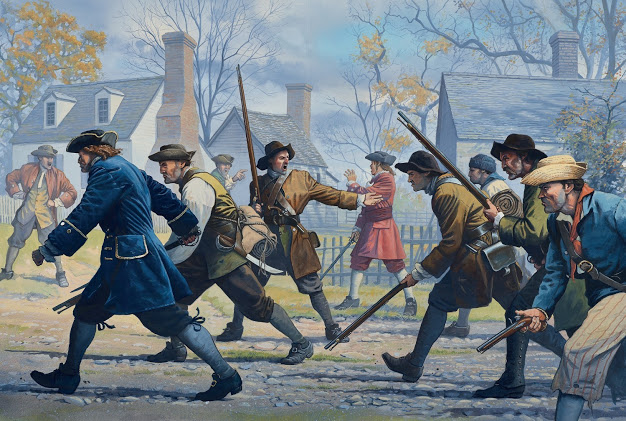Finally, the Supremes wake up:
The Supreme Court on Thursday slashed the Environmental Protection Agency’s (EPA) regulatory control over water bodies in a win for conservative critics who argued the agency wielded too much power.
The court ruled that the 1972 Clean Water Act, which allows the EPA to regulate wetlands, only applies to wetlands that are obviously connected to larger regulated water bodies.
Now go and read the details of the case, because if ever there was an example of gross bureaucratic overreach, this would be it.
And I’m glad that the USSC (for once) did the right thing, instead of punting or letting the gummint get away with this. Otherwise:
 (I know, “Where are the tar and feathers?” but go with me…)
(I know, “Where are the tar and feathers?” but go with me…)

I used to look St the Supreme Court as the last, best hope for preserving liberty. However, after many years, I have begun to lose hope. This case, and a few others, restores that hope. A little.
I have little faith in SCOTUS to do the right thing. Hopefully Thomas et all hang in there long enough to get a good Republican in the White House and control of the Senate to confirm good conservatives onto the bench.
I lost faith in SCOTUS with their ruling in Kelo. Trump’s appointments have made me feel a little better about SCOTUS but they still aren’t moving far enough in the right direction.
JQ
I think that case and the EPA’s bootstrapping logic parallels the execrable Wickard v. Filburn case that let the Feds into our bedrooms, bathrooms, cars, fields and farms, every aspect of our lives involving a transaction or producing something under the guise of influencing interstate commerce.
Socialist bastard FDR (PBUH) wanted to regulate every product made in the USA, and the SCOTUS in Wickard decided that if a farmer grew wheat over his quota amount to feed his cows, then he might be depriving some farmer in another state of an opportunity to sell him wheat across a state line, and therefore the first farmer was engaged in interstate commerce and subject to FDR’s whim.
Stare decisis be damned, I wish someone would find a legal wedge to allow that awful decision to be revisited just as Roe v Wade was.
Valine,
You’re absolutely right. That was a bad ruling from SCOTUS
JQ
They had that wedge. Scalia nibbled away at the edges of the over-reaching interpretation of the commerce clause for a decade. For example, the SC rejected the first version of the Violence Against Women Act because it didn’t make a clear connection to interstate commerce. (Congress rewrote it to correct this and passed it again.) Then the SC was presented with the perfect case for finding that the commerce clause did not allow federal regulation of non-commercial production for ones own use, within a single state. Gonzales v. Raich. But because it was about marijuana, Scalia went all fascist and re-affirmed the federal power of banning (NOT regulating) something that was neither interstate nor commerce, just because they also banned that product when it was grown for sale, and sometimes that sale was interstate. And no one has questioned whether the commerce clause covers _everything_ since then.
In the Jerry Pournelle/Larry Niven rewrite of _Inferno_, two US Senators are buried to their necks in ice in the Vale of Traitors, and still arguing about their votes on some issue about ICBMs decades earlier. They voted opposite ways on a question that could threaten the existence of the USA, with their parties but against their own beliefs. So they were both traitors.
I imagine Scalia buried next to them for that decision.
Putting the brakes on agency overreach, ridiculous rulings like the man not allowed to build on his property because it was once a wetland and home to an endangered frog, both long gone.